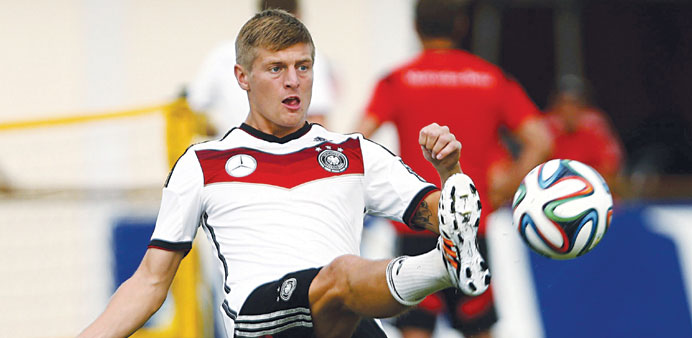|
Germany are looking forward to a World Cup final against Argentina after enjoying the upper hand against their South American opponents in recent tournament meetings. |
Despite the warnings by coach Joachim Loew of Argentina’s all-round strength and individual ability, Germany will start as favourites in the Maracana stadium tomorrow.
Germany have also had a day longer to recover. While they were able to coast in their 7-1 semi-final hammering of Brazil on Tuesday, after leading 5-0 at half-time, Argentina were taken to extra-time and penalties before defeating the Netherlands 4-2 in the shoot-out in Sao Paulo on Wednesday.
The last three meetings between the two sides at World Cups all resulted in German victories. Germany won the 1990 final in Rome 1-0, knocked Argentina out of the 2006 World Cup quarter-finals on penalties in Berlin, and again defeated Argentina in the 4-0 quarter-finals four years ago in Cape Town.
Before that though, Argentina enjoyed a 3-2 victory over West Germany in the 1986 final in Mexico City. The last meeting between the two sides was a friendly in Frankfurt in August 2012 which Argentina won 3-1.
“We’ve arranged it in recent times so that Argentina win the friendly games while we win the competitive matches. I’m banking on this continuing,” German football federation president Wolfgang Niersbach said.
However no one in the German camp expects a repeat of the semi-final thrashing of Brazil, or the sort of victory enjoyed over Argentina in South Africa four years ago.
Argentina are defensively much stronger and have a compact midfield which closes opponents down quickly, as was evident Wednesday when Dutch danger men Arjen Robben and Robin van Persie had trouble getting into the game.
German central defender Mats Hummels believes it could be a similarly tight affair in Rio, with Germany unlikely to find the space they enjoyed against Brazil in Belo Horizonte.
“The final is going to be damned hard. Nobody should expect it is going to be in any way similar to against Brazil,” he said.
Argentina have been effective rather than spectacular in reaching the final despite the genius of Lionel Messi, who has four of his side’s seven goals in six games.
Most of the tournament statistics, including pass accuracy and distances covered, also favour Germany, although Argentina have taken more shots in general and have had only three fewer shots on goal, at 61-64.
Argentina are also one of the few sides with a positive record over Germany, standing at nine victories to six defeats with five matches drawn.
For coach Joachim Loew, it will be a second major final after losing 1-0 to Spain in the final of Euro 2008.
Spain and Italy have stopped Germany at semi-final stages of the 2010 World Cup and Euro 2012 respectively.
But Argentina will give Loew fewer sleepless nights than two European sides who have had the psychological edge over Germany in recent years.
“Argentina are defensively strong, compact, well organised. In attack they have outstanding players like Messi and (Gonzalo) Higuian. We’ll be well prepared and are looking forward to Rio,” Loew said.
Four years ago Germany punished Argentina, coached by Diego Maradona, with fast counter-attacking football, and Loew will now be plotting how best to overcome a stronger side coached by Alejandro Sabella.
Loew has the flexibility to change his tactics but may now retain Miroslav Klose as an orthodox striker rather than revert to using three attacking midfielders, a system used initially in the tournament.
Sami Khedira and Bastian Schweinsteiger, who were back together for the first time in the 1-0 defeat of France in the quarter-finals, have been successfully reunited in defensive midfield following injury problems.
Klose, who is now the all-time top World Cup scorer with 16 goals, said: “If we analyse the opponents as we did against Brazil and put everything into effect then I think we have a good chance.”
The Khedira-Schweinsteiger combination has allowed Loew to switch Philipp Lahm back from midfield to right-back, ending the debate on where the captain is best deployed.
Loew is now favouring Hummels alongside Bayern Munich’s Jerome Boateng in central defence, leaving Per Mertesacker on the bench, while the experiment of using Schalke’s Benedikt Hoewedes - who usually also plays centre back - as left-back has also paid off.
With keeper Manuel Neuer and five-goal Thomas Mueller, Loew has two of the tournament’s top players, but the coach is still waiting for “a moment of genius” from midfielder Mesut Oezil. Perhaps the Arsenal man is saving it for the final.

